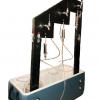Yes, this confusion among professionals is why companies have been advised to stay away from the expensive testing and filter replacements until you get dinged for it.
If compressed air was part of our packaging process (food contact or food contact surface) I would force management to do the expensive air testing annually.
Lots of strong language in The Guidance, but lots of leeway to risk assess away for your product.
11.5.7.2 Testing can be conducted to validate the compressed air-filtration control system’s effectiveness based on the risk to the product; however, testing must be conducted at a minimum of once a year. Testing can be done in-house or by a contracted party. Test requirements and number of samples will be based on the risk to the product and process. Microbiological testing can include testing for aerobic plate count and/or indicator organisms as appropriate to the operation. Testing for moisture is to be considered if moisture is a potential risk to the product (e.g., dry operations).
Aseptic sample collection needs to be used. There are a wide variety of measures available, including the use of air sampling equipment, use of sterile sponges, membrane filtration and others.
The site may consider the following controls for particulates
i. Intake filters to remove atmospheric dirt and solid particulates.
ii. Microorganisms – A point-of-use filter, minimum 0.01 micron, prevent pathogenic microorganisms from contaminating food. An effective PM program should be in place to maintain the integrity of the filter. Validation from the filter manufacturer is often considered adequate validation.
iii. Water, including vapor, liquid, condensed. A dryer in the compressed air system provides effective control. An effective PM program should be in place.
iv. Oil, including vapor, liquid and aerosols. The presence of coalescing filters in the compressed air system effectively removes contamination. An effective PM program should be in place to maintain the integrity of the filter.
We installed a 0.01 micron filter, and the filter manufacturer says as long as the "Purity" Read Out on the machine does not go up, then the filter is still effective. I log this number twice every day.


















